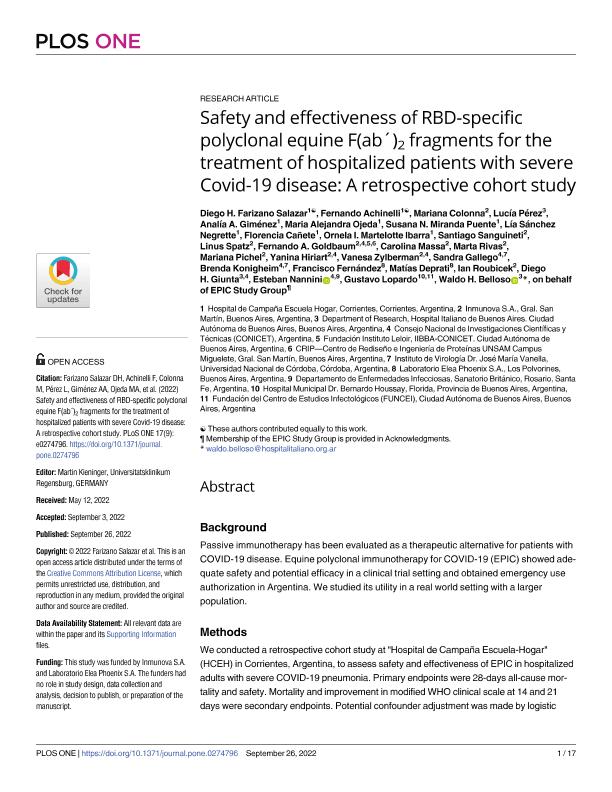Artículo
Safety and effectiveness of RBD-specific polyclonal equine F(ab´)2 fragments for the treatment of hospitalized patients with severe Covid-19 disease: A retrospective cohort study
Farizano Salazar, Diego H.; Achinelli, Fernando; Colonna, Mariana; Pérez, Lucía; Giménez, Analía A.; Ojeda, Maria Alejandra; Miranda Puente, Susana N.; Sánchez Negrette, Lía; Cañete, Florencia; Martelotte Ibarra, Ornela I.; Sanguineti, Santiago ; Spatz, Linus; Goldbaum, Fernando Alberto
; Spatz, Linus; Goldbaum, Fernando Alberto ; Massa, Carolina; Rivas, Marta; Pichel, Mariana; Hiriart, Yanina
; Massa, Carolina; Rivas, Marta; Pichel, Mariana; Hiriart, Yanina ; Zylberman, Vanesa
; Zylberman, Vanesa ; Gallego, Sandra Veronica
; Gallego, Sandra Veronica ; Konigheim, Brenda Salome
; Konigheim, Brenda Salome ; Fernández, Francisco; Deprati, Matías; Roubicek, Ian; Giunta, Diego Hernan
; Fernández, Francisco; Deprati, Matías; Roubicek, Ian; Giunta, Diego Hernan ; Nannini, Esteban
; Nannini, Esteban ; Lopardo, Gustavo; Belloso, Waldo Horacio
; Lopardo, Gustavo; Belloso, Waldo Horacio
 ; Spatz, Linus; Goldbaum, Fernando Alberto
; Spatz, Linus; Goldbaum, Fernando Alberto ; Massa, Carolina; Rivas, Marta; Pichel, Mariana; Hiriart, Yanina
; Massa, Carolina; Rivas, Marta; Pichel, Mariana; Hiriart, Yanina ; Zylberman, Vanesa
; Zylberman, Vanesa ; Gallego, Sandra Veronica
; Gallego, Sandra Veronica ; Konigheim, Brenda Salome
; Konigheim, Brenda Salome ; Fernández, Francisco; Deprati, Matías; Roubicek, Ian; Giunta, Diego Hernan
; Fernández, Francisco; Deprati, Matías; Roubicek, Ian; Giunta, Diego Hernan ; Nannini, Esteban
; Nannini, Esteban ; Lopardo, Gustavo; Belloso, Waldo Horacio
; Lopardo, Gustavo; Belloso, Waldo Horacio
Fecha de publicación:
09/2022
Editorial:
Public Library of Science
Revista:
Plos One
ISSN:
1932-6203
Idioma:
Inglés
Tipo de recurso:
Artículo publicado
Clasificación temática:
Resumen
Background Passive immunotherapy has been evaluated as a therapeutic alternative for patients with COVID-19 disease. Equine polyclonal immunotherapy for COVID-19 (EPIC) showed adequate safety and potential efficacy in a clinical trial setting and obtained emergency use authorization in Argentina. We studied its utility in a real world setting with a larger population. Methods We conducted a retrospective cohort study at “Hospital de Campaña Escuela-Hogar" (HCEH) in Corrientes, Argentina, to assess safety and effectiveness of EPIC in hospitalized adults with severe COVID-19 pneumonia. Primary endpoints were 28-days all-cause mortality and safety. Mortality and improvement in modified WHO clinical scale at 14 and 21 days were secondary endpoints. Potential confounder adjustment was made by logistic regression weighted by the inverse of the probability of receiving the treatment (IPTW) and doubly robust approach. Findings Subsequent clinical records of 446 non-exposed (Controls) and 395 exposed (EPIC) patients admitted between November 2020 and April 2021 were analyzed. Median age was 58 years and 56.8% were males. Mortality at 28 days was 15.7% (EPIC) vs. 21.5% (Control). After IPTW adjustment the OR was 0.66 (95% CI: 0.46–0.96) P = 0.03. The effect was more evident in the subgroup who received two EPIC doses (complete treatment, n = 379), OR 0.58 (95% CI 0.39 to 0.85) P = 0.005. Overall and serious adverse events were not significantly different between groups. Conclusions In this retrospective cohort study, EPIC showed adequate safety and effectiveness in the treatment of hospitalized patients with severe SARS-CoV-2 disease.
Palabras clave:
Pneumonia
,
polyclonal equine
,
immunotherapy
,
COVID-19
Archivos asociados
Licencia
Identificadores
Colecciones
Articulos(IDICER)
Articulos de INSTITUTO DE INMUNOLOGIA CLINICA Y EXPERIMENTAL DE ROSARIO
Articulos de INSTITUTO DE INMUNOLOGIA CLINICA Y EXPERIMENTAL DE ROSARIO
Articulos(IIBBA)
Articulos de INST.DE INVEST.BIOQUIMICAS DE BS.AS(I)
Articulos de INST.DE INVEST.BIOQUIMICAS DE BS.AS(I)
Citación
Farizano Salazar, Diego H.; Achinelli, Fernando; Colonna, Mariana; Pérez, Lucía; Giménez, Analía A.; et al.; Safety and effectiveness of RBD-specific polyclonal equine F(ab´)2 fragments for the treatment of hospitalized patients with severe Covid-19 disease: A retrospective cohort study; Public Library of Science; Plos One; 17; 9-2022; 1-17
Compartir
Altmétricas



